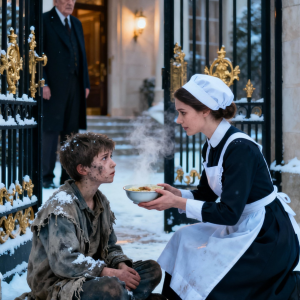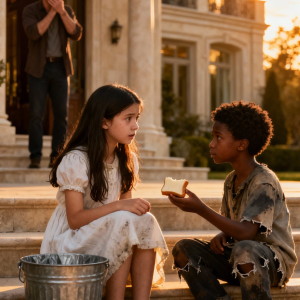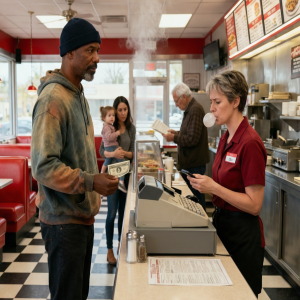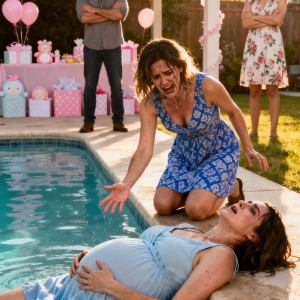
When Mara’s twin sons came home from their college program and told her they never wanted to see her again, everything she’d fought for seemed to collapse.
But the truth behind their father’s sudden return forced her into an unbearable choice: protect the past or fight for what was left of their future.
I got pregnant at 17, and the first thing I felt wasn’t fear — it was shame.
Not because of the babies, but because I had already learned how to take up less space, how to tuck my growing belly behind school cafeteria trays and pretend everything was normal while girls my age tried on prom dresses.
While they posted about homecoming, I was swallowing saltines during third period. While they stressed about college, I wondered if I’d still graduate. My world became dim exam rooms, WIC paperwork, and cold Doppler gel instead of fairy lights and dances.
Caleb told me he loved me. Varsity starter, perfect smile, the type of boy teachers forgave for anything. Behind the old movie theater, when I told him I was pregnant, he pulled me close and promised, “We’ll figure it out, Mara. We’re a family now.”
By the next morning, he was gone. No call, no note — just his mother standing in the doorway telling me he was “gone out west” and shutting the door in my face. Then he blocked me on everything.
But in the dark ultrasound room, I saw them — two tiny heartbeats side by side. And something inside me hardened into resolve.
My parents were embarrassed when they found out, but when my mother saw the sonogram, she cried and said she’d help. When the boys were born — first Elias, then Jonah — they were perfect. Elias arrived furious, fists clenched; Jonah came quiet and wise-eyed.
The early years blurred into fevers, bottles, and lullabies whispered through exhaustion. I learned the sound of stroller wheels, cried over cracked peanut-butter dinners, baked every birthday cake from scratch because store-bought felt like defeat.
As they grew, their differences grew too. Elias was fire — impulsive, stubborn, bold. Jonah was calm, thoughtful, steady. We had rituals: Friday movie nights, pancakes on test days, a hug before leaving the house no matter how much they pretended it embarrassed them.
When they were accepted into a dual-enrollment program for high school juniors, I cried in my car afterward. We had made it. Until the day everything fell apart.
One stormy Tuesday, I came home soaked from a double shift to a house unnervingly silent. The boys sat rigidly on the couch. Elias spoke first:
“Mom, we need to talk.”
I sat down, heart pounding.
“We can’t stay here anymore. We’re done,” Elias said.
“What are you talking about?”
“Mom… we met our dad,” Jonah said softly. “We met Caleb.”
The name froze me.

“He’s the director of our program,” Jonah added. “He told us you kept him from us.”
“He said you shut him out,” Elias snapped. “That he tried to help.”
“That is a lie,” I whispered. “He disappeared. I was 17. He left.”
“Mom, he said if you don’t cooperate, he’ll get us expelled,” Jonah said. “He wants you to play happy family at some banquet.”
I stared at my sons — scared, confused, manipulated. Then I told them the truth. And they listened.
“What do we do?” Elias asked.
“We agree,” I said. “And then we expose him when everyone’s watching.”
The night of the banquet, Caleb arrived polished and smug. He posed with us like we were trophies. When he took the stage, he dedicated the night to “my sons, Elias and Jonah… and their remarkable mother.”
Every word was a lie.
Then he called the boys onstage. The crowd clapped. He grinned, hand on Elias’s shoulder.
Elias stepped forward.
“I want to thank the person who raised us,” he began.
Caleb puffed up proudly.
“And that person is not this man,” Elias said. Gasps erupted.
“He abandoned our mother when she was 17. He never showed up, not once. And last week, he threatened us.”
“Enough!” Caleb barked.
But Jonah stepped beside his brother.
“Our mom is the reason we’re here. She worked three jobs. She never left us. She deserves everything. Not him.”
The room exploded into applause. Administrators rushed out. By morning, Caleb was fired, under investigation, and publicly disgraced.
That Sunday, I woke to the smell of pancakes. Elias was humming over the stove. Jonah sat peeling oranges.
“Morning, Mom,” Elias said, flipping a pancake.
I stood in the doorway and smiled.




